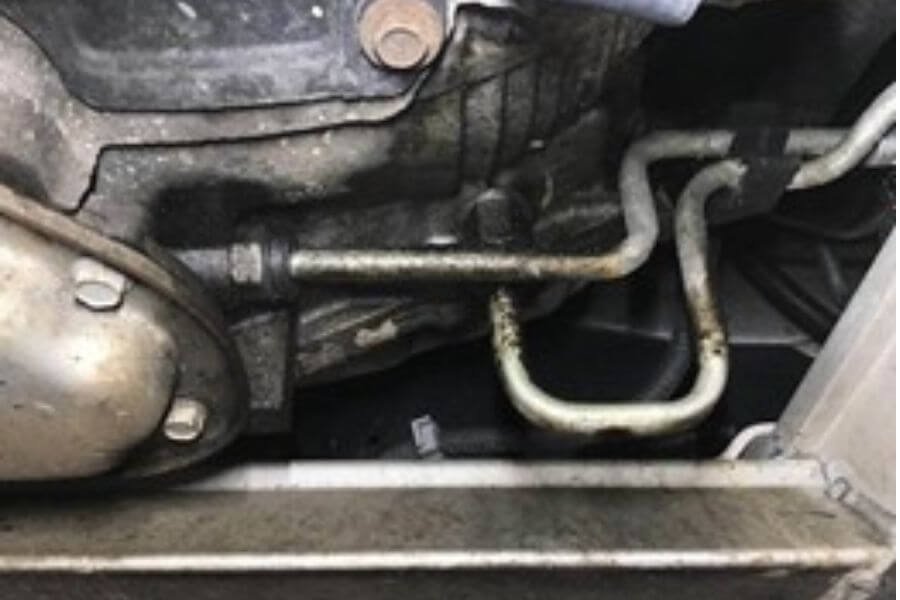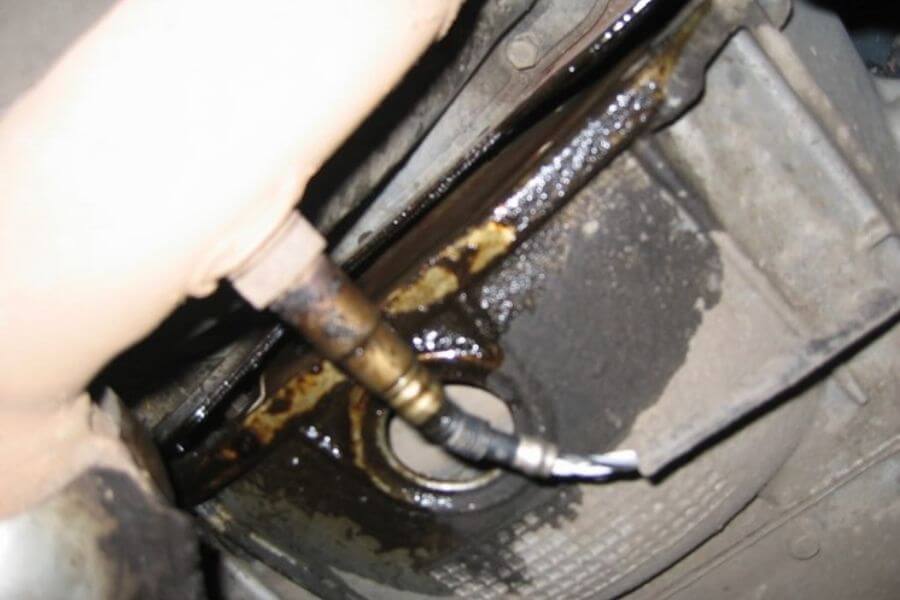Why is my transmission leaking?
Automatic transmissions use transmission fluid to cool internal parts, lubricate bearing surfaces, and to hydraulically operate switches and solenoids inside of the transmission. Like anything that is full of fluid, an automatic transmission can start leaking over time. Sometimes these leaks are easy to fix and cost very little, while other leaks can point at serious problems within the transmission. An automatic transmission system can hold anywhere from 3 quarts to over 20 quarts of transmission fluid, and that transmission fluid level is essential to proper function. When an automatic transmission leaks and the fluid level goes down, this can cause the transmission to slip, have erratic shifting, or even fail to go into gear.

A low fluid level condition will also cause the transmission to overheat. Keep in mind that transmissions do not react well to high heat, so it is important to make sure that your automatic transmission is full of quality transmission fluid and that you don’t ignore leaks that can turn into more expensive repairs. Let’s take a look at some of the reasons your transmission might be leaking, and what steps you can take to correct them.
Where is it leaking?
Transmissions can leak anywhere there is a seal between 2 parts. Some very common places that transmissions will leak are:
- The transmission pan
- The front pump
- The rear transmission seal
- Parts on the outside of a transmission like solenoids, case connectors, servo covers, or transmission linkage
- The transmission dipstick tube
- The transmission cooler lines (at the transmission, radiator or even external cooler)

In each of these cases, there is a seal, gasket or o-ring that is used between the parts to maintain the sealed environment. However, over time these seals or gaskets will break down and allow fluid to begin to leak out of the transmission. In these cases, a repair usually involves simply replacing the seal, gasket or o-ring in order to fix the leak and won’t cost a tremendous amount. That is, if you get the leak fixed quickly and don’t allow the transmission to operate too long without the right fluid level! This can quickly cause damage inside of the transmission and what could have been a simple, inexpensive repair will now involve a costly transmission rebuild or replacement.
That is, if you get the leak fixed quickly and don’t allow the transmission to operate too long without the right fluid level! This can quickly cause damage inside of the transmission and what could have been a simple, inexpensive repair will now involve a costly transmission rebuild or replacement.
Internal issues
There are situations where damage inside of the transmission will cause what appears to be a leak. In cases where the transmission has overheated or has been over-filled with transmission fluid, the transmission will “vent” this fluid out of a vent hole in order to release the excessive pressure inside of the transmission. This fluid will drip down the sides of the transmission case and then drip onto the ground and will often look like a leak from the transmission pan or other parts of the transmission case. In these situations, you need to have a qualified transmission specialist look at your vehicle to determine why the transmission has vented and what is necessary to correct the problem. Again, don’t ignore a transmission leak or hope that just topping off the transmission fluid will make things go away. The sooner you address the issue, the less likely you will have a costly repair to deal with!
Misdiagnosis
A discovery of transmission fluid on your garage floor doesn’t always mean you have a transmission problem. In many vehicles, you might be surprised to know that automatic transmission fluid or ATF is the fluid used in the power steering system. Traditional ATF and power steering fluid are hydraulic fluids. These fluids allow power transfer between the fluids to mechanical components. Power steering systems have a few areas where leaks are common so a skilled technician should be able to differentiate a leak in the power steering system versus the transmission. Similarly, many transfer cases use transmission fluid and it is important to work with a drivetrain specialist who can accurately identify the source of your transmission fluid leak.

Other leaks
Sometimes it is easy to confuse leaks as coming from the transmission when they are in fact coming from somewhere else in the vehicle. For instance, the engine’s rear main seal is located right where the transmission’s flywheel and torque converter meet. When this starts leaking, engine oil begins to leak from the front of the transmission. The engine’s oil pan is also right in the same area, and an oil pan gasket that is leaking can also look like it is coming from the transmission. Other engine leaks from the top or sides of the engine can also leak down onto the transmission case and appear to be coming from the transmission. In cases like these, you have an engine issue that will need to be addressed. Your qualified transmission repair shop can make recommendations on the best place to take your vehicle to get these issues addressed. Just like with your automatic transmission, leaks anywhere on the vehicle should not be ignored and should be fixed as quickly as possible!
A transmission leak is a top 10 symptom of a bad transmission. Transmission repair is far more economic if addressed early, rather than waiting for a complete unit failure. There are consequences to ignoring transmission issues.
If you have a transmission leak or any other transmission related issue, contact Advanced Transmission Center at either of our locations and we’d be happy to help! Unlike dealerships or many independent repair shops, we are transmission specialists trained to fix issues related to a vehicle’s drive-train. You can reach out to either location that is most convenient for you.
Additional Considerations
What are the main causes of transmission fluid leaks and how can I identify them?
Transmission leaks can result from worn seals, gaskets, or connections within the transmission system. Identifying the leak often involves checking common leak points like the transmission pan, front pump, rear seal, and cooler lines.
How serious are transmission leaks and what immediate actions should I take upon noticing one?
Transmission leaks can lead to significant issues like slipping gears and overheating. Immediate actions include checking fluid levels, avoiding driving if the leak is severe, and consulting a specialist.
Can regular maintenance prevent transmission leaks?
Regular inspections and maintenance can significantly reduce the risk of transmission leaks by ensuring seals and gaskets are in good condition and fluid levels are appropriate.
Advanced Transmission Center is a Colorado-owned and operated auto repair shop with locations in Denver / Lakewood and Westminster. ATC specializes in driveline issues such as automatic transmission repair, four wheel drive repair, clutch replacement, differentials, manual transmissions and CVT. As Colorado's first AAA approved shop our goal is to provide accurate, timely service with exceptional customer satisfaction. All of our technicians are certified in the latest makes and models and we are one of the few transmission repair shops with a nationwide warranty.



 Free Customer Towing Service
Free Customer Towing Service  Free TrueTest™ Inspection
Free TrueTest™ Inspection  Fast Transmission Services
Fast Transmission Services  Comprehensive Warranty in Denver
Comprehensive Warranty in Denver 


























Pingback: Common Problems with 8, 9 & 10-Speed Car Transmissions
Pingback: Common NV3500 HM290 Transmission Problems and How to Fix Them
Pingback: Maintenance Tips for NV3500 HM290 Transmissions